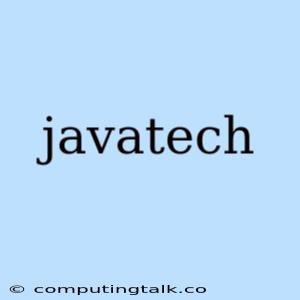Exploring the World of JavaTech
JavaTech is a broad term encompassing a vast and ever-evolving world of Java-related technologies. It encompasses everything from core Java programming principles to advanced frameworks and libraries, making it a dynamic and powerful tool for developers worldwide. Let's delve deeper into this realm and understand what makes JavaTech so compelling.
What is JavaTech?
JavaTech, in its simplest form, refers to the technology stack built around the Java programming language. This includes:
- Java SE (Standard Edition): The foundation of Java programming, providing core functionalities for application development.
- Java EE (Enterprise Edition): Extends Java SE with functionalities for developing enterprise-level applications, such as web applications, distributed systems, and enterprise resource planning (ERP) solutions.
- Java ME (Micro Edition): Designed for resource-constrained devices like mobile phones and embedded systems.
Why is JavaTech So Popular?
The popularity of JavaTech stems from several key factors:
- Platform Independence: Java's "Write Once, Run Anywhere" philosophy allows developers to write code once and run it on various platforms without modification. This portability is highly valuable in a world with diverse operating systems and devices.
- Robustness: Java's strong typing system and memory management features contribute to its stability and reliability, making it suitable for mission-critical applications.
- Large and Active Community: Java boasts a massive and vibrant developer community, offering extensive support, resources, and readily available solutions to common problems.
- Wide Range of Applications: From enterprise software to mobile apps and embedded systems, JavaTech has found applications in nearly every domain.
- Extensive Libraries and Frameworks: The Java ecosystem is rich in libraries and frameworks that simplify and accelerate development, covering areas like web development, data processing, and machine learning.
Exploring Key Components of JavaTech
Let's explore some key components of JavaTech:
1. Java Virtual Machine (JVM):
- What is it?: The JVM is the core execution engine for Java programs. It acts as a runtime environment that translates compiled Java bytecode into machine-readable instructions for the underlying operating system.
- Why is it important?: The JVM ensures platform independence, allowing Java programs to run on any system with a compatible JVM.
2. Java Development Kit (JDK):
- What is it?: The JDK is a software development kit that provides tools for developing and running Java applications. It includes the JVM, the Java compiler (javac), and various libraries and utilities.
- Why is it important?: The JDK is essential for any Java developer, providing the necessary tools for coding, compiling, and running Java applications.
3. Java Class Library:
- What is it?: The Java class library is a collection of pre-written code that provides a wide range of functionalities, from basic input/output operations to complex networking and data structures.
- Why is it important?: The class library saves developers time and effort by providing ready-to-use components for common tasks, allowing them to focus on core application logic.
4. Frameworks and Libraries:
- What are they?: Frameworks and libraries are reusable code components that provide specific functionalities and abstractions, simplifying complex tasks and promoting code reusability.
- Why are they important?: Frameworks like Spring and libraries like Apache Commons provide developers with ready-made solutions for common challenges, accelerating development and improving code quality.
JavaTech: A Gateway to Exciting Possibilities
JavaTech opens doors to a vast array of career opportunities and technical possibilities. Here are some examples:
- Web Development: Frameworks like Spring Boot and Jakarta EE provide powerful tools for creating dynamic and scalable web applications.
- Mobile Development: Java has been used for mobile app development, particularly for Android applications.
- Big Data and Analytics: Java is commonly used in big data processing and analytics platforms like Hadoop and Spark.
- Cloud Computing: Java is a prominent language for developing cloud-based applications and services, leveraging platforms like AWS and Azure.
Learning JavaTech: A Comprehensive Guide
Learning JavaTech requires a structured approach. Here are some tips for getting started:
- Fundamentals: Start with understanding core Java programming concepts like object-oriented programming, data types, control flow, and methods.
- Practice: Code regularly to solidify your understanding and develop practical skills. Use online platforms like Codewars and LeetCode to challenge yourself with coding exercises.
- Online Resources: Utilize online learning platforms like Coursera, Udemy, and edX for structured courses and tutorials.
- Community Engagement: Participate in online forums and communities to interact with other developers, share knowledge, and learn from their experiences.
Conclusion
JavaTech remains a vital and enduring force in the technology landscape. Its power, flexibility, and strong community make it an ideal choice for developers of all levels. Whether you're just starting your programming journey or seeking to expand your skills, exploring the world of JavaTech can lead to exciting opportunities and rewarding experiences.
